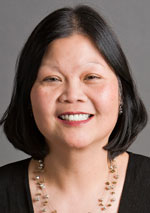Pope Francis’ recent visit to the United States has touched each of us in so many ways through words, gestures and that indelible twinkle in his eyes whenever he is with people. There is much to unpack in our own journey of faith. I want to begin with the moniker affectionately given to him: the “people’s pope.”
He is not just the Catholic pope, the Christian pope, the pope of believers, but he is a “holy father” to everyone. He directs his message of God’s limitless love and mercy to all, including prisoners, the lowliest in society. There is no “they” in his lexicon. There is only the part in each of us that strays from God’s grace and the part of us that seeks God despite our own hardness.
In our language and conceptual development, the definitions of “we” and “they” emerge quickly. “We” are those who are like us, love us, affirm us and from whom we forge our identity and worth. “They” are different from us, sometimes simply in ways that are neutral and even welcoming (different foods, ethnic dances and festivals, languages).
It doesn’t have to be, but somehow “they” may eventually become threatening.
[hotblock]
“These people” take up space in our neighborhoods, schools, workplaces. Soon “they” become competitors over whom we must keep a wary eye, keep in their places, build sturdier fences against.
“They” could require special services, draw on resources that are already scarce. “Their” values can infect our culture and corrupt our children. If “they” are successful, we resent them. If “they” are weak, we find them unworthy and burdensome.
This past summer, I was particularly struck by two individuals who helped me soften these boundaries. Oliver Sacks, who recently died, channeled his inner turmoil and used his expertise to illumine in humorous and humane ways the neurological disorders of his patients in the “mental ward.” These stories allowed me see beyond the “crazy” behaviors to the profound suffering of people, just like me, who have names, families, dreams and longings.
Then there was the photographer who took the picture of Aylan Kurdi, the 3-year-old Syrian boy washed up on the shores of Turkey. It connected us immediately to our emotions from the loss of a child who could be our own. The perils and conflicts were no longer far away in some “other” country where “they” lived.
Our hearts were opened before our minds could close them. As Pope Francis called for each parish to sponsor a family, we can see how there could be a solution, how feasible that is, and how our own faith and humanity depend on our stepping up.
At his last Mass in Philadelphia, Pope Francis urged us not to be afraid, but to take courage, wander out, seek dialogue, encounter and listen. It must be the Holy Spirit that scheduled readings of the day from Numbers and Luke that specifically address the issue of who is in and who is out of God’s circle. To this, Pope Francis preached:
“The disciples, for their part, acted in good faith. But the temptation to be scandalized by the freedom of God, who sends rain on the righteous and the unrighteous alike (Mt 5:45), bypassing bureaucracy, officialdom and inner circles, threatens the authenticity of faith.
“Hence it must be vigorously rejected. Once we realize this, we can understand why Jesus’ words about causing ‘scandal’ are so harsh. For Jesus, the truly ‘intolerable’ scandal consists in everything that breaks down and destroys our trust in the working of the Spirit!”
***
Woo is president and CEO of Catholic Relief Services.



Share this story